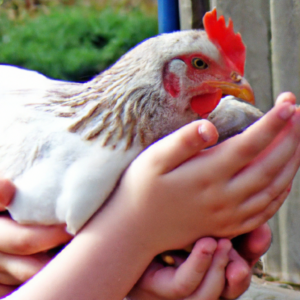
During a scorching summer heatwave, keeping your chickens healthy and happy becomes crucial. But what exactly should they be eating to thrive during these sweltering temperatures? Finding the ideal diet for your feathered friends can make all the difference in ensuring they stay cool and stay productive. In this article, we will explore some essential dietary considerations for chickens during a summer heatwave, helping you provide them with the nourishment they need to beat the heat and continue laying those delicious eggs.
Water
Importance of water for chickens
Water is a vital component of a chicken’s diet, especially during a summer heatwave. Just like humans, chickens rely on water to stay hydrated, regulate their body temperature, aid in digestion, and support overall health and well-being. Without access to an adequate supply of fresh and clean water, chickens can quickly become dehydrated and suffer from heat stress. It is essential to ensure that your chickens have constant access to clean, cool water throughout the day to help them stay cool and healthy.
Providing fresh and clean water
To provide fresh and clean water for your chickens, it is crucial to regularly clean and refill their water containers. Chickens have a tendency to soil their drinking water, which can lead to bacterial growth and illness. Clean the water containers thoroughly and refill them with fresh water at least once a day, or more often if necessary. You can also consider using waterers with automatic or gravity-fed systems that ensure a continuous supply of clean water, reducing the risk of contamination.
Using water additives
During a summer heatwave, you can also consider using water additives to further support the health and well-being of your chickens. Electrolyte supplements can be added to their drinking water to replenish essential minerals lost through sweating and help them stay hydrated. Additionally, there are water-soluble vitamin supplements available, which can provide a boost of essential vitamins for chickens during hot weather. When using water additives, it is important to follow the manufacturer’s instructions and consult with a poultry expert if necessary.
Energy and Protein
Increasing energy intake
Providing sufficient energy to your chickens during a summer heatwave is essential for maintaining their overall health and productivity. Chickens require more energy to regulate their body temperature during hot weather, so it’s important to adjust their diet accordingly. Increasing the amount of energy-dense feeds, such as grains and seeds, can help meet the increased energy requirements of your chickens.
Choosing high-quality protein sources
Protein is crucial for the growth, development, and overall health of chickens. During a summer heatwave, chickens may experience a decrease in appetite, leading to reduced protein intake. To ensure that your chickens receive an adequate amount of protein, it is important to choose high-quality protein sources. Incorporating protein-rich feeds, such as soybean meal, fishmeal, or mealworms, can help maintain the protein levels necessary for healthy chicken development.
Grains and Seeds
Benefits of grains and seeds
Grains and seeds are an essential part of a chicken’s diet as they provide carbohydrates, energy, and essential nutrients. During a summer heatwave, it is important to include grains and seeds in your chicken’s diet to help meet their increased energy demands. Additionally, grains and seeds provide necessary dietary fiber, which aids in digestion and promotes gut health.
Types of grains and seeds to include in the diet
When choosing grains and seeds for your chicken’s diet, it is important to select a variety that is suitable for their nutritional needs and preferences. Common grains and seeds that are beneficial for chickens include corn, wheat, barley, millet, sunflower seeds, and flaxseeds. Offering a mixture of different grains and seeds can provide a diverse range of nutrients, ensuring a balanced diet for your chickens.
Fruits and Vegetables
Importance of fruits and vegetables
Including fruits and vegetables in your chicken’s diet is not only beneficial for their overall health but also provides essential vitamins, minerals, and antioxidants. During a summer heatwave, fruits and vegetables can act as a natural source of hydration, helping to keep your chickens cool and prevent dehydration.
Recommended fruits and vegetables for chickens
Some fruits and vegetables are particularly beneficial for chickens during hot weather. Watermelon, cucumber, strawberries, and leafy greens such as lettuce and spinach are excellent choices for keeping your chickens hydrated. These fruits and vegetables also provide essential nutrients and help support immune function. It is important to offer a variety of fruits and vegetables to ensure a well-rounded diet for your chickens.
Herbs and Forage
Benefits of herbs and forage
Herbs and forage play a vital role in a chicken’s diet, providing essential nutrients, promoting natural foraging behaviors, and enhancing overall well-being. During a summer heatwave, herbs and forage can offer additional benefits by providing cooling and refreshing properties.
Herbs to include in the diet
Certain herbs can help chickens cope with heat stress by supporting their overall health and providing natural cooling effects. Mint, basil, oregano, and parsley are herbs known for their cooling properties and can be added to your chicken’s diet. These herbs can be offered fresh or dried, and chickens will often enjoy foraging for them in their outdoor environment.
Foraging tips
To encourage natural foraging behaviors, consider allowing your chickens access to a safe and secure outdoor space where they can search for insects, worms, and vegetation. This not only supplements their diet with additional nutrients but stimulates their natural instincts. Ensure your chickens have access to shaded areas and protect them from predators while they enjoy their foraging activities.
Vitamins and Minerals
Essential vitamins for chickens
Vitamins are essential for the overall health and development of chickens. During a heatwave, certain vitamins can be particularly important for supporting their immune system, thermoregulation, and overall vitality. Vitamins A, D, E, and B-complex are crucial for maintaining optimal health in chickens.
Minerals required during a heatwave
In addition to vitamins, chickens require specific minerals to support their body functions during a heatwave. Calcium, phosphorus, and potassium are especially important during a hot spell as they help with heat stress management, muscle function, and egg production. To ensure your chickens receive sufficient minerals, provide a balanced diet that includes calcium-rich sources such as oyster shell or crushed eggshells.
Electrolytes
Importance of electrolytes
Electrolytes play a vital role in maintaining proper hydration, nerve function, and muscle function in chickens. During a summer heatwave, electrolytes can become depleted through sweating, posing a risk to your chickens’ health. Supplementing their diet with electrolytes can help replenish these essential minerals and support their overall hydration status.
Commercial electrolyte solutions
Commercial electrolyte solutions are readily available and can be easily added to your chickens’ drinking water. These solutions are formulated to provide the necessary balance of electrolytes and minerals needed to support hydration and overall health. It is important to carefully follow the manufacturer’s instructions for dosing and ensure that the electrolyte solution is appropriate for poultry use.
Homemade electrolyte recipes
If you prefer to make your own electrolyte solution, there are homemade recipes available using simple ingredients such as salt, sugar, and baking soda. However, it is important to ensure that the homemade electrolyte solution is properly balanced and does not contain any harmful or toxic ingredients. Consult with a poultry expert or veterinarian for guidance on creating a safe homemade electrolyte solution.
Grit and Calcium
Providing grit for digestion
Grit plays a crucial role in aiding the digestion process for chickens. Chickens do not have teeth, so they rely on small, hard particles of grit to grind their food in the gizzard. During a summer heatwave, it is especially important to provide an adequate supply of grit to support the digestion of the increased feed intake necessary to meet their energy demands.
Calcium supplementation for egg production
Calcium is a vital nutrient for egg-laying hens, and during a heatwave, their calcium requirements remain high. Supplementing calcium-rich sources, such as oyster shell or crushed eggshells, can ensure that your hens receive the necessary calcium to maintain eggshell quality and prevent calcium-related health issues. Providing a separate container of calcium in addition to their regular feed allows hens to consume calcium as needed.
Avoiding Heat Stress
Preventing heat stress in chickens
Heat stress can have severe consequences for chickens, including decreased egg production, poor growth, and even death. Prevention is key in avoiding heat stress during a summer heatwave. Provide proper shade, ensure adequate ventilation in their coop, and avoid overcrowding as these factors can contribute to increased heat and humidity levels.
Shade and ventilation
Creating shaded areas in your chicken’s environment is crucial to help them escape the direct heat of the sun. Provide natural shade from trees or use artificial shading materials like tarps or umbrellas. Ensuring proper ventilation in your chicken coop is also essential, as it allows for the exchange of hot air with cooler ambient air, helping to lower the overall temperature inside the coop.
Cooling strategies
Implementing additional cooling strategies can help chickens cope with extreme heat. Installing misters, fans, or evaporative cooling systems near their living areas can provide relief and help lower their body temperature. Offering frozen treats, such as ice blocks with fruits and vegetables, can also help chickens cool down and stay hydrated during hot weather.
Monitoring and Adjusting
Observing chicken behavior
Regularly observing your chickens’ behavior is crucial to ensure their well-being and make necessary adjustments to their diet and environment. During a summer heatwave, pay close attention to signs of heat stress, such as panting, lethargy, reduced appetite, or unusual behavior. These indicators can help you determine if modifications to their diet, shade, ventilation, or cooling strategies are necessary.
Making adjustments to the diet
Based on your observations and consultation with poultry experts, you may need to make adjustments to your chicken’s diet during a summer heatwave. This may include increasing the amount of energy-dense feeds, adding more electrolytes to their water, or providing additional cooling foods such as watermelon or cucumber. It is important to make gradual changes to their diet and monitor their response to ensure they are receiving the proper nutrition and hydration to thrive during hot weather.
In conclusion, providing the ideal diet for chickens during a summer heatwave involves ensuring they have access to fresh and clean water, increasing their energy intake, incorporating grains and seeds, offering fruits and vegetables, providing herbs and forage, meeting their vitamin and mineral needs, supplementing with electrolytes, providing grit and calcium, avoiding heat stress, and regularly monitoring and adjusting their diet and environment. By following these guidelines, you can help your chickens stay cool, hydrated, and healthy during hot weather, promoting their overall well-being and productivity.







